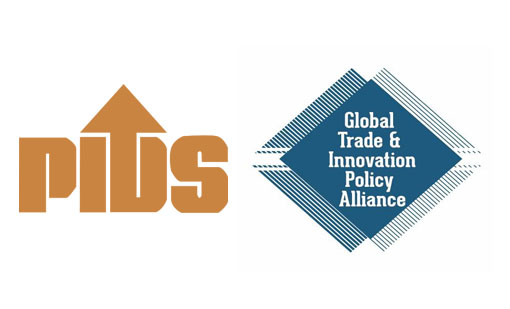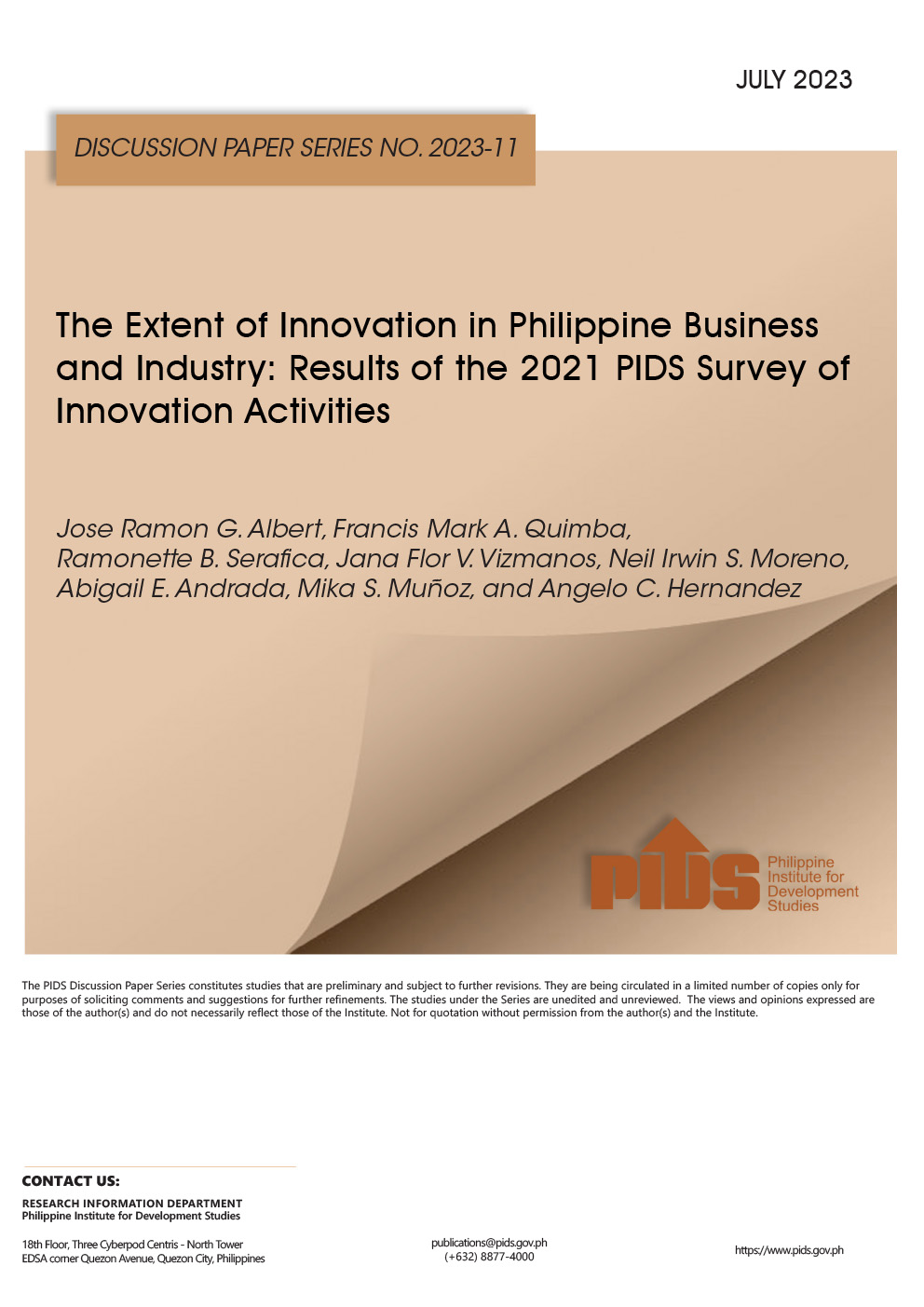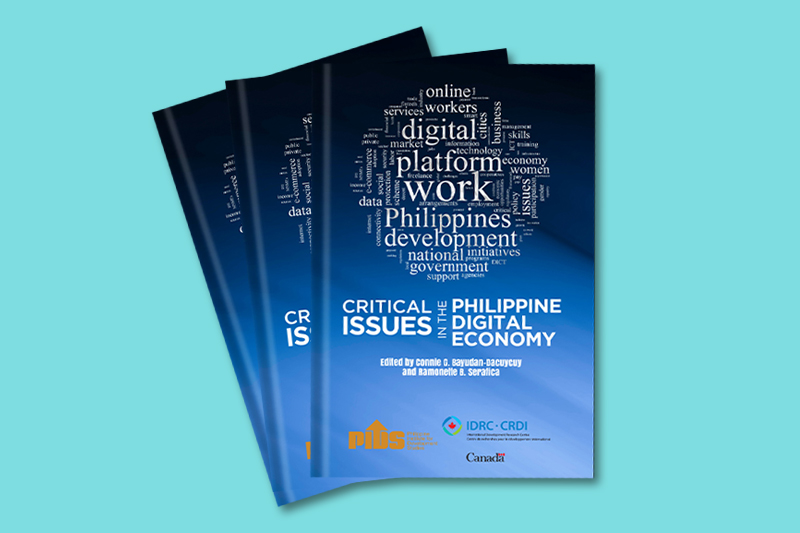
The Philippine Institute for Development Studies (PIDS) is proud to be part of the Global Trade and Innovation Policy Alliance (GTIPA), an international think tank network that formulates evidence-based research policies to expand trade and investment, foster innovation-based growth and development strategies, and encourage governments to play proactive roles in spurring innovation and productivity.
“Our membership in the GTIPA is an important step for us to participate in the global conversation on trade, innovation, and technology in a meaningful manner. More importantly, engaging with top think tanks from around the world will help deepen our understanding of international issues and trends, which we hope to feed in the formulation of innovation, productivity-enhancing, and inclusive growth-promoting policies in support of AmBisyon Natin 2040, the collective long-term vision of the Philippines, and the Philippine Medium-Term Development Plan,” said PIDS President Celia Reyes.
Participating in the GTIPA is also aligned with the Institute’s goal to boost policy research and advocacy on competition, technology, and innovation. It has completed a number of studies on these topics and also devoted the whole month of September this year to awareness-raising activities, policy dialogues, and seminars about the Fourth Industrial Revolution (FIRe) as part of the nationwide celebration of the annual Development Policy Research Month (DPRM). The DPRM aims to promote the importance of policy research in the formulation of evidence-based development policies and programs in the country. Part of the DPRM celebration is the Annual Public Policy Conference. The 2018 APPC carried the theme “Harnessing the Fourth Industrial Revolution: Creating our Future Today” to emphasize the significant opportunities as well as the challenges that the Philippines may face in the advent of the FIRe.
The GTIPA, also known as the Alliance, was launched by the “Information Technology and Innovation Foundation (ITIF) in 2016 as a platform to highlight and cross-pollinate member organizations’ work on trade, globalization, and innovation policy, and to collaborate on events, research, reports, and efforts to develop policy on related topics”. As part of their commitment, all members of the Alliance have signed a Shared Statement of Principles. The 10 principles include: (1) Innovate, innovate, innovate; (2) Expand trade and investment; (3) Leverage core strengths; (4) Eliminate protectionist barriers; (5) Spur across-the-board productivity; (6) Promote competition; (7) Strengthen fundamentals; (8) Set national strategies; (9) Focus on creating the conditions for growth, not on job growth per se; and (10) Align global economic policy.
“Cross-border trade has made the global economy much more tightly integrated over the past few decades, and this has created new opportunities to boost growth and development. When nations share a dedication to playing by the rules and encouraging across-the-board growth, globalization can generate lasting, worldwide prosperity,” said Stephen Ezell, ITIF’s vice president for global innovation policy, and one who spearheads the Alliance.
The Alliance has produced collaboratively authored content, such as the Declaration of Mutual Interests in Trade and Globalization for the Benefit of All People’s and Nations, and is working on the forthcoming report on comparative global innovation policies. It has also hosted events such as the recently completed 2018 GTPIA Summit: Shaping Policies for Tomorrow’s Innovations, held in Milan, Italy.
Aside from PIDS, Fundacion Eleutera of Honduras, Libertad y Desarrollo of Chile, and Libertad y Progreso of Argentina are among the newest members of the GTIPA. The US-based network now has a total membership of 32 think tanks from all over the world.
The PIDS is a nonstock, nonprofit government corporation created on September 26, 1977, by virtue of Presidential Decree No. 1201. As the country’s primary socioeconomic think tank, it conducts policy-oriented studies to assist policymakers in crafting development policies, plans, and programs that are based on sound research evidence. ###
“Our membership in the GTIPA is an important step for us to participate in the global conversation on trade, innovation, and technology in a meaningful manner. More importantly, engaging with top think tanks from around the world will help deepen our understanding of international issues and trends, which we hope to feed in the formulation of innovation, productivity-enhancing, and inclusive growth-promoting policies in support of AmBisyon Natin 2040, the collective long-term vision of the Philippines, and the Philippine Medium-Term Development Plan,” said PIDS President Celia Reyes.
Participating in the GTIPA is also aligned with the Institute’s goal to boost policy research and advocacy on competition, technology, and innovation. It has completed a number of studies on these topics and also devoted the whole month of September this year to awareness-raising activities, policy dialogues, and seminars about the Fourth Industrial Revolution (FIRe) as part of the nationwide celebration of the annual Development Policy Research Month (DPRM). The DPRM aims to promote the importance of policy research in the formulation of evidence-based development policies and programs in the country. Part of the DPRM celebration is the Annual Public Policy Conference. The 2018 APPC carried the theme “Harnessing the Fourth Industrial Revolution: Creating our Future Today” to emphasize the significant opportunities as well as the challenges that the Philippines may face in the advent of the FIRe.
The GTIPA, also known as the Alliance, was launched by the “Information Technology and Innovation Foundation (ITIF) in 2016 as a platform to highlight and cross-pollinate member organizations’ work on trade, globalization, and innovation policy, and to collaborate on events, research, reports, and efforts to develop policy on related topics”. As part of their commitment, all members of the Alliance have signed a Shared Statement of Principles. The 10 principles include: (1) Innovate, innovate, innovate; (2) Expand trade and investment; (3) Leverage core strengths; (4) Eliminate protectionist barriers; (5) Spur across-the-board productivity; (6) Promote competition; (7) Strengthen fundamentals; (8) Set national strategies; (9) Focus on creating the conditions for growth, not on job growth per se; and (10) Align global economic policy.
“Cross-border trade has made the global economy much more tightly integrated over the past few decades, and this has created new opportunities to boost growth and development. When nations share a dedication to playing by the rules and encouraging across-the-board growth, globalization can generate lasting, worldwide prosperity,” said Stephen Ezell, ITIF’s vice president for global innovation policy, and one who spearheads the Alliance.
The Alliance has produced collaboratively authored content, such as the Declaration of Mutual Interests in Trade and Globalization for the Benefit of All People’s and Nations, and is working on the forthcoming report on comparative global innovation policies. It has also hosted events such as the recently completed 2018 GTPIA Summit: Shaping Policies for Tomorrow’s Innovations, held in Milan, Italy.
Aside from PIDS, Fundacion Eleutera of Honduras, Libertad y Desarrollo of Chile, and Libertad y Progreso of Argentina are among the newest members of the GTIPA. The US-based network now has a total membership of 32 think tanks from all over the world.
The PIDS is a nonstock, nonprofit government corporation created on September 26, 1977, by virtue of Presidential Decree No. 1201. As the country’s primary socioeconomic think tank, it conducts policy-oriented studies to assist policymakers in crafting development policies, plans, and programs that are based on sound research evidence. ###












